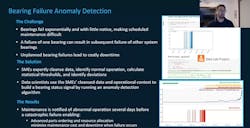Machine learning helps IT, OT teams anticipate equipment breakdowns long before they happen
Downtime is anathema to any strong and streamlined manufacturing operation. Machines still break down, so some downtime is unavoidable, but what if OT and IT personnel had the tools—virtual Deloreans driven by Doc Brown and Marty McFly—to peek into the future and anticipate breakdowns in time to head them off with preventive maintenance.
Seeq senior analytics engineers Emilio Conde and Sean Tropsa were on the scene Oct. 5 to show off the Seattle-based company’s advanced analytics tools for processing the tons of data that manufacturers gather from their operations. Thursday’s webinar, which was packed with attendees, was sponsored by Seeq as part of this week's Smart Industry Fall Insight Series, which concludes on Oct. 6. Editor-in-Chief Robert Schoenberger moderated the engaging hourlong chat. A recording of the event is available now.
Next up: How To Capitalize On Generative AI In Your Manufacturing Business
AI and machine learning play prominent parts in the future-predicting magic that Seeq’s analytics SaaS solutions wield, and Conde and Tropsa demonstrated some scenarios where Seeq’s solutions could prevent internal breakdowns in plant machinery that can cut into the bottom line.
Seeq’s solution? SMEs cleanse available data on the machine’s operation, they identify normal operation, calculate statistical thresholds—in this case the maximum stress on bearings and the point where they might fail—and identify deviations from their normal performance.
The result? Maintenance is notified of abnormal operation days before a possible failure. That's the definition of predictive maintenance.
Seeq’s solutions aren’t one-size-fits-all, Tropsa noted. The company has preview servers available for any industry IT personnel who want to test Seeq's solutions and see how they might be adapted to fit their employers' operations.
“There is no one algorithm that will solve all problems,” he added. “This is why it’s important to have flexible analytics platforms.”
And a plant process engineer doesn't necessarily need to know complex software coding to use Seeq's solutions because they were originally designed for process engineers, who might not necessarily hold that knowledge, though taking advantage of some capabilities since the original release make coding acumen handy.
Seeq's solutions are all about manufacturers reaching their their digital transformation goals. More than 88% of companies fall short.
"Assess how your digital transformation is going," Conde advised. "Many organizations are data rich, evaluation poor."





